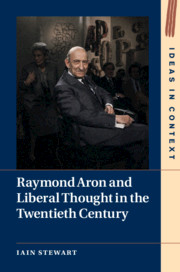Refine search
Actions for selected content:
4 results
Introduction
-
- Book:
- Raymond Aron and Liberal Thought in the Twentieth Century
- Published online:
- 18 October 2019
- Print publication:
- 07 November 2019, pp 1-20
-
- Chapter
- Export citation
Chapter 6 - Raymond Aron and the Liberal Moment in Late Twentieth-Century French Thought
-
- Book:
- Raymond Aron and Liberal Thought in the Twentieth Century
- Published online:
- 18 October 2019
- Print publication:
- 07 November 2019, pp 207-234
-
- Chapter
- Export citation
Chapter 3 - Antitotalitarianism
-
- Book:
- Raymond Aron and Liberal Thought in the Twentieth Century
- Published online:
- 18 October 2019
- Print publication:
- 07 November 2019, pp 77-119
-
- Chapter
- Export citation

Raymond Aron and Liberal Thought in the Twentieth Century
-
- Published online:
- 18 October 2019
- Print publication:
- 07 November 2019
